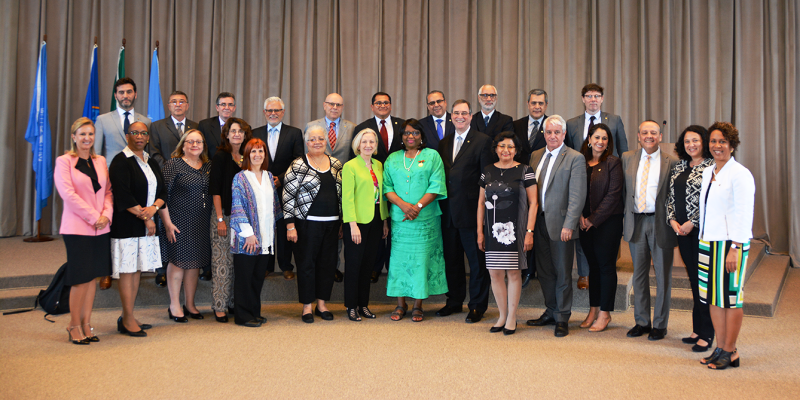The PAHO Office in Brazil hosted the Manager’s meeting for South American countries and subregions. From March 12 to March 16, 2018, representatives from the different countries and the directors of the three specialized centers of the Organization (CLAP, PANAFTOSA and BIREME), met with the PAHO/WHO Director, Dr. Carissa F. Etienne, as well as with members of her work team, in order to discuss key points for improving the functioning of the Organization and promoting health in Latin America and the Caribbean.
The inauguration of the South American meeting was attended by the PAHO/WHO Director, Dr. Etienne; the PAHO/WHO Representative in Brazil, Dr. Joaquín Molina, the PAHO/WHO Associate Director, Dr. Isabel Danel; the Head of Country and Subregional Coordination, Ms. Ana Treasure; and PAHO/WHO Chief of Staff, Dr. Merle Lewis. As the host of the event, PAHO/WHO Representative welcomed the group and presented the advances of the Sistema Único de Saúde (SUS – Unified Health System) for Brazil.
 Topics discussed during the event included: strategies for the elimination of infectious diseases in the Region; promoting health; dissemination and implementation of the Sustainable Health Agenda for the Americas 2018-2030 (SHAA 2030); perspectives for resources mobilization; universal health strategy; PAHO/WHO communication strategy and each country challenges; lessons learned during emergency and disasters; and the role of PAHO Representations in the countries concerned.
Topics discussed during the event included: strategies for the elimination of infectious diseases in the Region; promoting health; dissemination and implementation of the Sustainable Health Agenda for the Americas 2018-2030 (SHAA 2030); perspectives for resources mobilization; universal health strategy; PAHO/WHO communication strategy and each country challenges; lessons learned during emergency and disasters; and the role of PAHO Representations in the countries concerned.
The presentations of Bolivia, Ecuador and Colombia on the panel entitled “People living in situations of vulnerability: Where are they? Who are they? How can we guarantee their access to health?”, as well as “Tools for placing the right for health above economic interests: the experience of tobacco in Uruguay and the labeling of food products in Chile”, were some of the successful experiences presented in different panels.
Dr. Diego González, Director of BIREME, moderated the Communication Strategy session, and had individual conversations with the PAHO/WHO Director, the Countries’ Representatives and the Regional Advisors. Dr. González pointed out the importance of events of this kind in order to organize actions for the different countries and subregions, as well as to disseminate BIREME’s potentials, products and services, thus guaranteeing its mission to democratize information, knowledge and scientific evidence.
 According to Ms. Ana Treasure, Head of Country and Subregional Coordination, “we leave these meetings with renewed strength, as they are rich in experience exchange and the lessons learned from other countries can be applied to our own. The reinforcement of relationships between the countries’ Representatives and the Regional and Subregional Advisors, and the Directors of the PAHO/WHO Specialized Centers (PANAFTOSA, CLAP and BIREME) is also of great importance”.
According to Ms. Ana Treasure, Head of Country and Subregional Coordination, “we leave these meetings with renewed strength, as they are rich in experience exchange and the lessons learned from other countries can be applied to our own. The reinforcement of relationships between the countries’ Representatives and the Regional and Subregional Advisors, and the Directors of the PAHO/WHO Specialized Centers (PANAFTOSA, CLAP and BIREME) is also of great importance”.
During one of her speeches, PAHO/WHO Director Dra. Carissa F. Etienne, emphasized that “not leaving anyone behind is not an option, it is an obligation and if necessary we must reorient technical cooperation in order to obtain different results and reach better health indicators”. She also pointed out “the importance of working with civil society and to make intersectorial efforts so as to achieve the Sustainable Development Goals”.
On the PAHO/WHO Subregional Managers’ meeting
The main objective of the Managers’ meetings is to identify strategies for consolidating PAHO’s position as the main public health agency and to optimize them nationally and sub regionally in the Caribbean, Central America and South America. This aims to define strategic, pragmatic and administrative approaches for national and sub regional technical cooperation, within the lines of corporative priorities for the next 5 years.
The results expected from each of these meetings are: (1) to provide an update on the health situation of the host country; (2) to find strategies for facing political, technical and administrative challenges, as well as to take advantage of national and sub regional opportunities; (3) to decide on agreements and approaches for the strategic positioning of the Organization, according to corporative priorities and collaboration with new partners; and (4) to strengthen existing partnerships, within a regional and global context that is constantly changing.